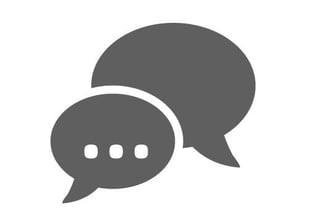What’s the Difference Between Content Marketing, Online Marketing, Digital Marketing, and Inbound Marketing?
WHAT’S THE DIFFERENCE BETWEEN CONTENT MARKETING, ONLINE MARKETING, DIGITAL MARKETING, AND INBOUND MARKETING?
As marketing tries to keep pace with technology, the terms we use to describe certain tactics and strategies also change.
This can cause some confusion, even for today's tech-savvy professionals.
But the number one question we often hear from business leaders and upper management is:
What's the difference between...
- Content Marketing
- Online Marketing
- Digital Marketing
- and Inbound Marketing?
To answer the question, let's take a closer look at each marketing term and the influences that shaped its development.
What is Content Marketing?
 I’ll start with content market because it’s the oldest of the bunch. Content marketing revolves around storytelling and conveying information in a variety of creative mediums.
I’ll start with content market because it’s the oldest of the bunch. Content marketing revolves around storytelling and conveying information in a variety of creative mediums.
Long before the internet, brands were actively using content marketing across various channels, even if the term wasn’t even muttered.
Printed materials turned into radio broadcasts – turned into television shows – turned into online videos – turned into blogs – turned into podcasts – turned into social media posts – turned into… well, the sky’s the limit with content these days.
Content marketing has evolved over time because it’s effective.
People want to be entertained and informed. Publishing original material will continue to be an effective strategy for any brand long into the future.
Content marketing, in fact, is a crucial component of any marketing strategy.
What is Online Marketing?
 When the internet hit, businesses raced for the chance to engage online users. Originally, the emphasis of online marketing began with the creation of websites.
When the internet hit, businesses raced for the chance to engage online users. Originally, the emphasis of online marketing began with the creation of websites.
But a “build it and they will come” philosophy proved to be short-lived. As search engines became more sophisticated, the emphasis of online marketing shifted to paid advertisements and SEO.
Rather than simply designing a great looking website, businesses began stuffing keywords and links into Frankenstein-esque websites to rank higher than the competition. Others began paying for real estate with online ads to drive more traffic.
Online marketing shifted again as Google restructured how it ranked the top sites based on user experience.
Gone were the days of keyword stuffing and out-of-context backlinks.
Once again, SEO best practices changed in stride. And those annoying pop-up, sidebar, and banner ads – well, you don’t see too many of them around anymore because people grew tired of the interruptive experience.
As a result, businesses recognized the value of consistently publishing fresh content on their websites, on blogs, and through social media. Kinda sounds like content marketing at this point.
I believe the term online marketing is dead, and I’ll explain why in the next section.
What is Digital Marketing?
 Digital marketing is the catch-all term of the group, and simply took the belt off online marketing’s waist out of necessity.
Digital marketing is the catch-all term of the group, and simply took the belt off online marketing’s waist out of necessity.
As mobile technology increased in popularity – and skyrocketed in functionality – online marketing didn’t sufficiently address both online (in the desktop sense) and mobile users.
While online marketing is generally associated with websites and social media, digital marketing includes the use of mobile applications, SMS messaging, email marketing, and real-time reporting in the form of analytics.
Digital marketing platforms have revamped how marketing campaigns are implemented, reviewed, refined, and measured.
Does that mean online marketing couldn’t be measured? No.
But the closed-loop technology at our fingertips now allows us to track digital marketing efforts for any channel –from launch to sale – more effectively than ever before.
What is Inbound Marketing?
 Inbound marketing is a methodology coined by HubSpot.
Inbound marketing is a methodology coined by HubSpot.
Based on the idea of converting visitors into leads, leads into customers, and customers into promoters, inbound marketing relies heavily on the notion that people don’t want to be sold to anymore.
Outbound marketing tactics, such as paid advertising, stop generating leads the minute you stop paying for the ads.
Inbound marketing, on the other hand, continuously develops leads over time using evergreen content and campaign strategies that encourage visitors to journey through the purchase process at their own pace.
Done well, inbound marketing can reduce your cost of customer acquisition and shorten the sales cycle.
That being said, inbound marketing isn’t limited to the HubSpot platform or it’s users. As a methodology, inbound marketing can be applied to any business.
However, we have found that the HubSpot platform is the most efficient tool to implement an inbound strategy for marketing and sales teams using marketing automation.
Which Terms Should We Use?
 As a HubSpot Partner Agency, we have close ties to inbound marketing. But many businesses are not familiar with the term. So we also use the term digital marketing quite a bit. It’s a tad more relatable across the board.
As a HubSpot Partner Agency, we have close ties to inbound marketing. But many businesses are not familiar with the term. So we also use the term digital marketing quite a bit. It’s a tad more relatable across the board.
As far as content marketing goes, we believe content is at the core of everything we do in marketing – so we mention content marketing in strategic discussions as a subset of inbound and digital marketing.
Regardless of the terms we use, our marketing strategies are based on the notion that people are more apt to research products and services on their own these days. They don’t want to be cold-called or interrupted with sales pitches.
Successful business recognize the importance of developing balanced marketing efforts to meet potential customers with the right information – at the right time – in the right place.
Looking to implement a content marketing (or should we say inbound marketing or digital marketing) strategy for your business? Get your copy of our ebook: How to Pitch Content Marketing to Your Boss.

